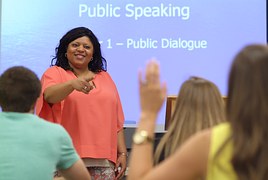
Bearing in mind that the pros of one system are often the cons of another, and that one person’s cons may be another person’s pros, here’s a look at some of the factors you should look at when deciding between online and conventional education.
- Prices
Perhaps the main draw of online education is that it’s a lot cheaper than conventional. It may cost over $10,000 for some more intensive courses – but that’s still a fraction of what college education can cost. Colleges after all have to pay for the upkeep of their buildings and grounds, whilst that’s not a problem online.
Many online resources, such as Express Online Training, offer training courses where you only pay after you pass. This is another huge draw for people who are looking to ‘top up’ existing skills or gain a certificate for work.
- Flexibility
Those who have full-time jobs, or care for family members, can find online education a great boon to their lives. Online courses are designed so that you can log in any time you want, night or day, rather than attending classes at a set time. Luckily, many websites also offer help and support 24/7!
This is perhaps the other main draw of online education, as not everyone necessarily flourishes in a structured environment. Many people simply prefer to learn at their own pace.
- Networking
One big pro of physical learning environments is that you will be in constant proximity to people who can serve as mentors or contacts for when it’s time to get a job. Online education sometimes offers mentorship programs, but it’s often not quite the same as seeing someone in class every day – or meeting them for a drink afterwards to discuss career prospects.
- Experiences
Many people go to college not so much for the education as for the experience – making new friends, doing new things, etc. While obviously it’s not impossible to make new friends from an online course, it’s fair to say that you’re not going to get the college experience from it.
But then again, the college experience isn’t necessarily for everyone. Older people, for example, may not feel they would fit into a college environment, but still want to learn.
- Social interaction
People learn in different ways, and some people simply learn best when there are others around them to bounce ideas off. This isn’t a thing you will get with online learning – although some online learning resources offer forums for students to discuss things in, it’s not quite the same. Some people simply need physical contact with others in order for new idea and thoughts to sink in.
- Motivation and discipline
Perhaps one of the biggest cons of online learning is that, at times, it can be difficult to motivate yourself to log on. If you don’t have much discipline when it comes to learning – and some people simply don’t – it can be easy to procrastinate. But in a classroom environment, the knowledge that other people will notice your absence (and judge you for it!) can be enough to motivate you to really knuckle down and try hard.
- Specific skills
Some skills are simply better learned online – skills like SEO, for example. It can be hard to teach people how to implement computer and social media skills in a traditional environment, especially if there are not enough computers to go around (it still happens!) but very easy indeed online.
But on the flip side, there are some practical skills that it is very difficult to learn online – sometimes, all the theory in the world can’t prepare you for actually physically taking part in something.
In conclusion – before jumping straight into one or the other, take some time and think about what you really want to get out of a course, and what sort of time and money you can spare. Education is rarely something to be taken lightly, so make sure you have all the information before making a decision.

